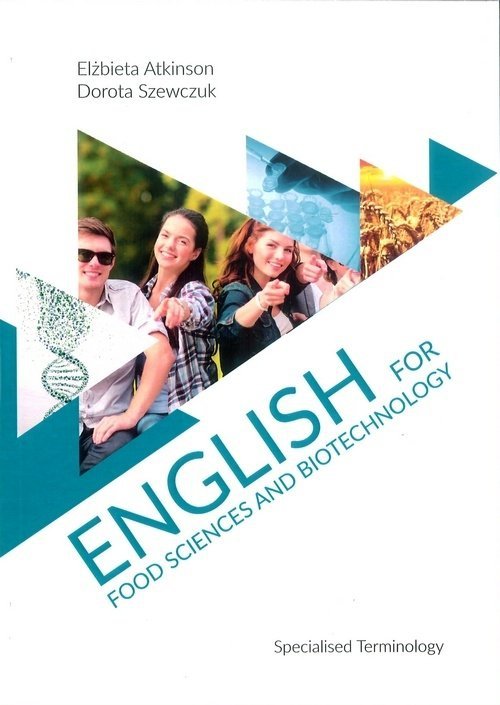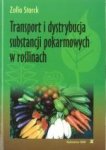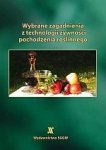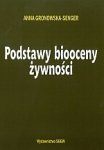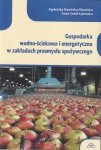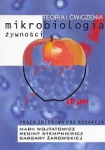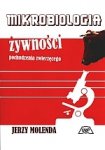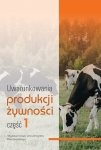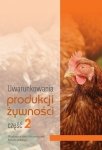-
Załączniki bezpieczeństwa
Załczniki do produktuZałączniki dotyczące bezpieczeństwa produktu zawierają informacje o opakowaniu produktu i mogą dostarczać kluczowych informacji dotyczących bezpieczeństwa konkretnego produktu
-
Informacje o producencie
Informacje o producencieInformacje dotyczące produktu obejmują adres i powiązane dane producenta produktu.Uniwersytet Przyrodniczy w Lublinie
-
Osoba odpowiedzialna w UE
Osoba odpowiedzialna w UEPodmiot gospodarczy z siedzibą w UE zapewniający zgodność produktu z wymaganymi przepisami.
English for Food Sciences and Biotechnology has been written to help students learn specialised English vocabulary from the fields of food sciences and biotechnology through a range of scientific texts. This course book is aimed at intermediate and upper intermediate learners of English and is suitable either for classwork or selfstudy.
The texts cited in the book have been published by renowned Polish and foreign scientific publishing houses as well as the institutions of the European Union and they correspond with problems included in teaching modules implemented by the Faculty of Food Sciences and Biotechnology at the University of Life Sciences in Lublin. The research and teaching staff of this faculty have been consulted regarding the material found in the book.
The course book is divided into eight units which contain English terminological lexis from the following thematic fields: I. Enzymology, II. Food Analysis, III. Food Biotechnology, IV. Food Safety, V. Food Contamination, VI. Food Technology, VII. Dietetics, VIII. Functional Foods.
Each unit of the book includes a variety of lexical, textural and communicative activities with instructions, which can be done by students in class with a teacher or at home with the answer key. The units contain tasks such as: reading for gist, reading for detail, word formation, multiple choice questions, True/False questions, gapfilling, matching, open questions, word search puzzles and crosswords.
The exercises are aimed at:
a) activating students' background knowledge about a specific topic,
b) perceiving new specialised English lexis on the basis of a text from professional literature,
c) introducing the acquired vocabulary into the terminological system of a given discipline and consolidating it in this system,
d) forming new terms on the basis of the learned words,
e) creating collocations and then using them in textual structures,
f) identifying semantic relations between specialised words,
g) differentiating between general vocabulary and scientific vocabulary.
The exercises can be completed individually, in pairs, in groups or as whole class activities. It is possible to select the units according to one's needs. The units including longer texts can be worked on over several classes or set as homework.
The texts used in the course book have been edited for didactic purposes, as suggested by the reviewer Christopher Garbowski. The changes introduced to the articles include: text segmentation, text shortening and deleting crossreferences. The texts have also been divided into paragraphs in order to make them more readable. The style and grammar used in the texts have not been modified. The references to the original versions of the texts cited in the book can be found in the bibliography.
Acknowledgements We would like to thank the Reviewer for his valuable comments and suggestions. We are also grateful to the research and teaching staff at the Faculty of Food Sciences and Biotechnology: Bozena Sosnowska, Piotr Jarocki and Tomasz Czernecki for their advice and guidance in the preparation of this book. We wish to thank the Head of the Foreign Languages Teaching Centre GraZyna Roguska for her cooperation. We would also like to express our gratitude to the Head of the English and Latin Unit Joanna Raczkiewicz, who tested the book with her students, for her support and encouragement.
Spis treści:
INTRODUCTION 5
UNIT I. ENZYMOLOGY 7
1. Enzyme basics 7
2. Safety of food enzymes 10
3. Genetically modified enzymes 14
UNIT II. FOOD ANALYSIS 17
1. Analysis of plant phenolic compounds 17
2. Meat speciation 21
3. Detection of olive oil adulteration 24
4. Differentiation of spirit drinks by means of fluorescence spectroscopy 27
UNIT III. FOOD BIOTECHNOLOGY 32
1. Biotechnological processes in food production 32
2. Genetically modified organisms (GMOS) 34
3. Safety of genetically modified food 37
UNIT IV. FOOD SAFETY 40
1. Food control systems 40
2. Rapid alert system for food and feed (RASFF) 42
3. Notifications in the rapid alert system for food and feed 45
4. Novel food 48
UNIT V. FOOD CONTAMINATION 50
1. Contaminants in food and feed — acrylamide 50
2. Mycotoxins and aflatoxins 52
3. Metals as contaminants in food 56
UNIT VI. FOOD TECHNOLOGY 59
1. Food processing and preservation 59
2. Fat replacers 62
3. Wheat flour substitues 64
4. Advances in food processing 66
UNIT VII. DIETETICS 69
1. Managing and preventing diabetes with diet 69
2. Low fodmap diet 74
3. Nutrigenomics 79
UNIT VIII. FUNCTIONAL FOODS 83
1. Plant sterols and stanols 83
2. Spices and herbs as nutraceuticals 87
3. Probiotics, prebiotics and synbiotics 91
BIBLIOGRAPHY 95
KEY 98
UNIT I. ENZYMOLOGY 98
1. Enzyme basics 98
2. Safety of food enzymes 98
3. Genetically modified enzymes 99
UNIT II. FOOD ANALYSIS 100
1. Analysis of plant phenolic compounds 100
2. Meat speciacition 101
3. Detection of olive oil adulteration 101
4. Differentiation of spirit drinks by means of fluorescence spectroscopy 102
Unit III. FOOD BIOTECHNOLOGY 103
1 . Biotechnological processes in food production 103
2. Genetically modified organisms (gmos) 103
3. Safety of genetically modified organisms 104
UNIT IV. FOOD SAFETY 104
1. Food control systems 104
2. Rapid alert system for food and feed (rasff) 104
3. Notifications in the rapid alert system for food feed 105
4. Novel food 105
UNIT V. FOOD CONTAMINATION 106
1. Contaminants in food and feed — acrylamide 106
2. Mycotoxins and aflatoxins 106
3. Metal as contaminants in food 107
UNIT VI. FOOD TECHNOLOGY 108
1. Food processing and preservation 108
2. Fat replacers 109
3. Wheat flour substitutes 109
4. Advances in food processing 109
UNIT VII. DIETETICS 110
1. Prevention and control of type-2 diabetes 110
2. Low fodmap diet
3. Nutrigenomics 112
UNIT VIII. FUNCTIONAL FOODS 112
1. Plant sterols and stanols 112
2. Spices and herbs as nutriceuticals 113
3. Probiotics, prebiotics and synbiotics 114
SELECTED SPECIALISED VOCABULARY 116


